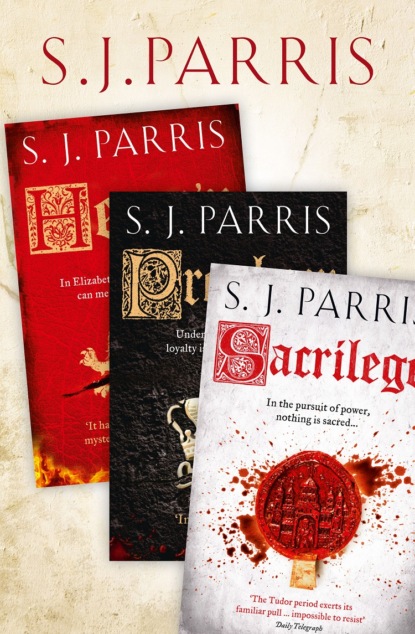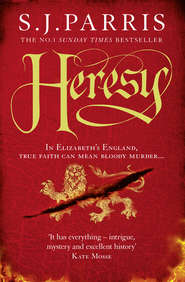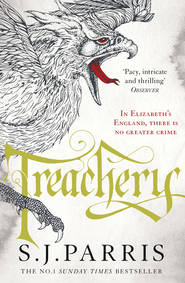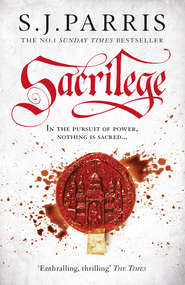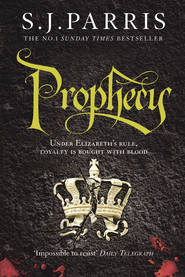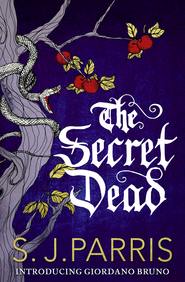По всем вопросам обращайтесь на: info@litportal.ru
(©) 2003-2024.
✖
Giordano Bruno Thriller Series Books 1-3: Heresy, Prophecy, Sacrilege
Автор
Год написания книги
2019
Настройки чтения
Размер шрифта
Высота строк
Поля
‘Philip – a man died in front of me this morning,’ I said wearily.
‘I know – I want to hear all about it,’ he said. ‘Come on, dress yourself, man – I have come to take you out to dinner.’
‘What time is it?’ I said, suddenly panicked; clearly I had slept much longer than I intended, and my stomach was crying out with hunger, but I had not yet even begun my preparation for the disputation at five.
‘Just past one.’ Sidney sauntered around the room, picking up books and considering them idly while I rummaged for clean hose and a plain doublet. ‘One lad at Christ Church said a wolf had got into the college – I thought that seemed unlikely. Did you see what happened?’
‘By tomorrow they’ll be saying it was a lion,’ I said. ‘These students seem starved of incident here, they will make legends out of any matter. But I will be glad to tell you all, for there is much that troubles me, and I have something to show you. Let us find some food first, though.’ I took the almanac from under my pillow and tucked it inside my doublet before fastening the buttons, Sidney watching me curiously as I did so.
The air was still damp though the sky was lighter as we passed under the tower gate into St Mildred’s Lane, then south past the tall spire of All Hallows Church. At the High Street we paused to let two riders on horseback pass, then crossed between piles of dung and straw that littered the muddy thoroughfare, churned up after all the rain. I was glad I had put on my riding boots. Young men in short black gowns hurried past us in groups, all chattering over one another. At the corner of a narrow lane edged by low timber-framed houses, Sidney turned and led me towards a two-storey building with gabled roofs which bore a painted sign creaking above its door: Peckwater Inn.
The cobbled yard was busy as we passed under the gate; men led horses across towards a stable block at the back as others unloaded heavy-looking barrels from a high cart. The building occupied three sides of a quadrangle, with two levels of balconies on each side overlooking the yard.
Inside, the tap-room was dim and a fire burned in a stone hearth at one end. Long, rough-hewn tables and benches were set around the edges of the room, many of them occupied already by busy diners talking and eating at once; a serving hatch was built into the wall opposite the fireplace, and a red-faced woman in an apron scuttled between it and the tables ferrying wooden platters and pewter tankards, pausing occasionally to brush a strand of damp hair from her face with the back of her hand. When she noticed us, her harried expression changed to one of delight and she rushed over, wiping her hands on her apron.
‘Sir Philip! What a pleasure – we heard you were back in town,’ she said with a wink. ‘They said there was a great procession in your honour.’
‘It was a very wet procession, and the honour was not mine, Lizzy,’ Sidney said, removing his hat and making a solemn bow. ‘May I present my dear friend from Italy, Doctor Giordano Bruno?’
‘Buongiorno, signorina,’ I said, playing up to Sidney’s exaggerated courtliness.
‘Pleasure, I’m sure,’ the tavern-mistress giggled, her considerable bosom quivering.
‘Now then, Lizzy – we’d like a quiet table, a jug of beer when you have a moment, your best game pie and some fresh bread, if you please.’
She beamed up at him.
‘You best take the corner table, you won’t be disturbed there,’ she said, and bustled off towards the kitchen.
‘I used to come here all the time,’ Sidney explained. ‘The inn is hard by Christ Church and there was more varied company to be had here than inside the college when I was a student, if you know what I mean. We will be well treated in any case, they know I tip generously. Now then, Bruno – tell your tale.’
He sat back and folded his hands together with the air of one who expects to be entertained. I could not help feeling he was taking a man’s death rather lightly, treating it as material for an exciting anecdote; in that he reminded me of Gabriel Norris. Perhaps it is a trait of rich boys, I thought: craving adventure in a life made dull by the absence of daily cares. I was about to launch into my account when Lizzy arrived with a jug of beer, two tankards and a loaf of bread that Sidney ripped into immediately, handing me the first piece.
With my mouth half-full, I told him of all that had happened since I was first awakened by the dog’s fearsome noise at dawn. When I came to the part about the locked gates, his complacent expression vanished and he leaned forward eagerly, his eyes alert.
‘You suspect foul play?’ he asked, as the tavern-mistress arrived again with a platter of thick game pie.
When she had gone, I told him of my visit to Roger Mercer’s room, the interruption by Slythurst and my sub sequent conversation with the old porter. When I had finished, Sidney whistled through his teeth.
‘Extraordinary business,’ he said, shaking his head in disbelief. ‘So you surmise someone set that dog on him on purpose, then ransacked his room looking for something valuable?’
‘That is the mystery,’ I said. ‘It can’t be valuable in the usual sense, because whoever did it had no interest in the ten pounds he was carrying, or the chest of gold in his room. But that is what I can’t fathom – someone lured him to the garden on the pretext of a meeting, clearly someone to whom he owed money. So why didn’t they take the money and then kill him?’
‘Not necessarily a debt,’ Sidney said, his mouth full. ‘Might it not have been someone who had something to sell?’
I frowned.
‘But what would he be buying at that hour, in the Grove? Something contraband, you think?’
Sidney was regarding me with amusement, a knowing smile playing about his lips.
‘Think, Bruno – what might a man want to buy under cover of darkness?’
I looked back at him blankly, then caught his meaning.
‘Whores, you mean? But in that case, how much simpler – and warmer – just to find a whorehouse in town.’ I shook my head. ‘Even if he was whoring – someone else knew to find him there at that time, someone who had a key to the Grove. And it still doesn’t explain who went through his room, or why. Whatever they were looking for must have been of value to the person who wanted it – the place was torn to shreds, as if they sought it with utmost urgency.’
‘But you say at least two people wanted whatever it might have been – the bursar and the other fellow who got there before you.’ Sidney’s brow creased for a moment and he took a long draught of beer. ‘One thing is strange, though. It’s such a cowardly way to kill a man, and so imprecise, too. If you want a man dead, why not just run him through with a sword? Especially if you know where to find him alone and unarmed. A dog is so unpredictable.’
‘You know about hunting,’ I said, cutting myself another brick of the pie. ‘Could a hound like that be trained to attack a particular person, follow a scent?’
Sidney considered.
‘I suppose – if it can be trained to follow the scent of a boar or a wolf, why not a man? If it was given one of his garments, perhaps. The Irish used to use them in battle – apparently they could pull an armoured knight off his horse. And you say it had been kept hungry, so its instincts would be all the keener.’ He leaned his elbows on the table and rested his chin on cupped hands. ‘It’s as if the dog were part of some kind of show, as if it were done to create a spectacle. And what a way to die – locked in with a bloodthirsty animal. Makes me think,’ he said, putting another hunk of bread into his mouth, ‘of how the Romans used to execute the early saints, by throwing them into an arena with wild beasts. The way John Foxe describes it in that grisly Book of Martyrs.’
I stopped, a piece of meat halfway to my mouth, and stared at him, slack-jawed.
‘What?’ Sidney stopped chewing.
‘Foxe’s Book of Martyrs. The rector of Lincoln has a great interest in him – he has been preaching sermons in chapel with Foxe as his text.’
Sidney frowned.
‘You think someone wanted to get rid of this Mercer and took inspiration from Foxe for his method?’
His expression betrayed his scepticism.
‘It does seem far-fetched. Perhaps I am reading too much into it.’ I passed my hands over my face. ‘You are right – it was probably just a bad debt or trouble over a whore. No wonder the rector wants it covered up while a royal visitation is in town.’
Sidney was silent for a moment. Then he banged a palm down on the table.
‘No, Bruno – I think you are right to be suspicious. The dog was loosed into the garden by someone who had a key, which suggests one of the Fellows or someone with access to the college keys. And at least two people wanted something from his room, but not money. Perhaps something that might be dangerous to them. And if everyone in the college has recently heard stories of the saints’ gruesome deaths from Foxe’s book, thanks to the rector – perhaps in some way it was staged as a deliberate copy. The question is, why? Did you find nothing in his room?’
‘Only this. Take a look,’ I said, extracting the slim almanac. ‘What do you notice first?’
Sidney turned a couple of pages, then looked up at me, his face serious.
‘Gregorian calendar. Was our man a secret papist after all, like his friend Allen?’
‘I wondered. I heard him cry out to Mary before he died.’
‘I’d cry to Mary if a dog that size was snapping at my arse,’ said Sidney bluntly, turning the book over in his hands. ‘That signifies nothing. But this calendar – you would only need this if you were corresponding with anyone in the Catholic countries. Especially if you needed to co-ordinate movements. Edmund Allen went to Rheims, did he not? Wasn’t he related to William Allen, who founded the English College there?’
‘A cousin, they said. Mercer could still have been in touch with him, you mean?’
Sidney glanced to either side and lowered his voice.
‘Remember why we are here, Bruno. These seminaries in Rheims and Rome are Walsingham’s greatest headache at the moment – they have vast funds from the Vatican and are in the business of training dozens of priests for the English mission, many of them former Oxford men.’ He pulled his beard into a point as he thought, then picked up the book again. ‘What is this little circle here?’ he asked, pointing to the wheel symbol that marked the previous day’s entry in Mercer’s calendar.





